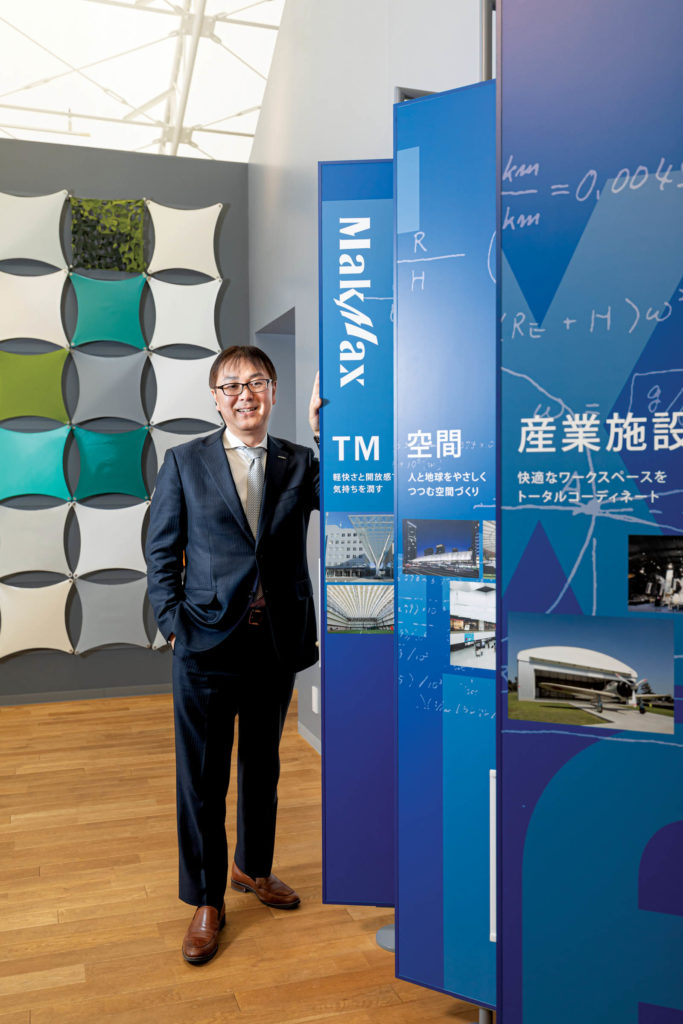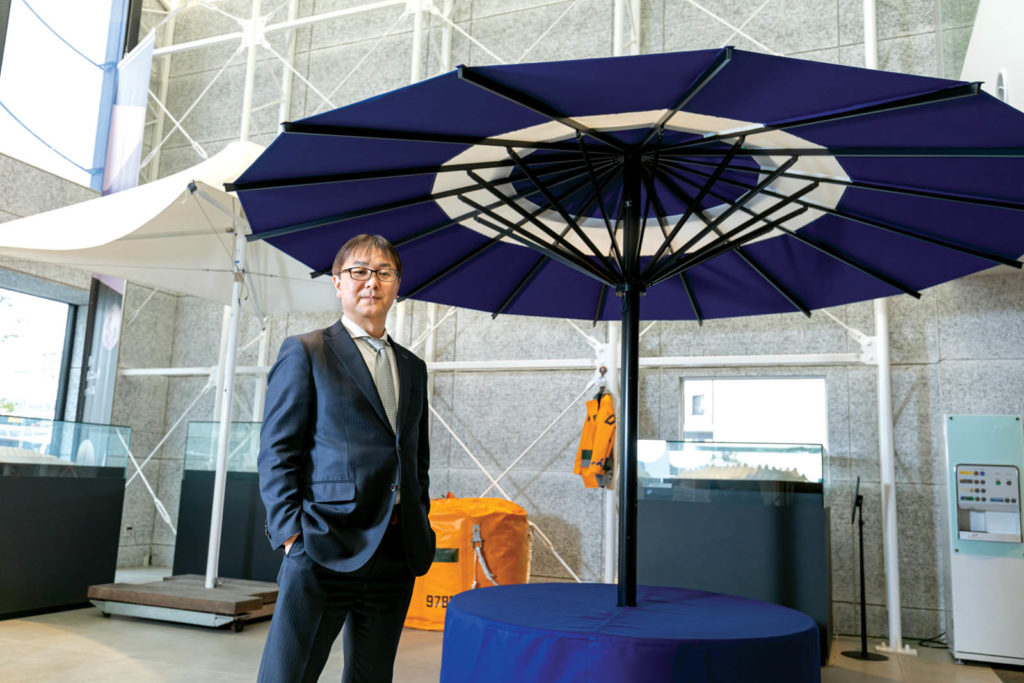
You may not have heard of Taiyo Kogyo Corp., based in Tokyo and Osaka, Japan, but you probably have a tangential relationship with the company through one of its 37 subsidiaries spread across 13 countries. Or maybe you’ve seen one of its hundreds of fabric structure projects around the world. Founded in 1922 as the Nohmura Tent Co., the company is a pioneer in building membrane structures and continues today under the guidance of its president, Hidefumi Araki.
Araki joined the Taiyo Kogyo Corp. in 1986, fresh out of high school, although it wasn’t part of his plan. He had other ideas about his career path.
“I initially wanted to be an Italian or French chef and I was planning to go abroad to study culinary,” he says. “But my mother, who was in the business, was very against the idea, to the extent that she was crying about me leaving.”
With those aspirations quashed, a chance meeting led him down a different path. As a fisherman and boater, Araki belonged to a community with people of all ages who had similar interests. One of the people within that community happened to be the personnel manager of Taiyo Kogyo. “This person invited me into Taiyo. He knew my mother was a restaurant owner and my father was also a small business owner, so he thought that I had the DNA of business and management within me.”
A subsequent appointment with the Human Resources manager almost ended his chances of joining the company. Araki unwittingly committed a Japanese social faux pas at this important meeting.
“The HR manager offered me a cigarette,” he says. “It’s customary in Japan that if you’re interviewing with a company, you would say, ‘No I don’t smoke.’ You don’t want to leave a bad impression. But without thinking, I said, ‘Sure, I’ll have one, thank you very much.’”
Maybe it was his youthful exuberance or perhaps he portrayed a sense of confidence, but what could have ruined Araki’s chances of getting into the company somehow worked in his favor.

A passion for building
As a child, Araki was skilled at building things in shop class. “When you’re creating something, the final shape it takes is all in your imagination and there’s no wrong answer,” he says. “It’s complete when you think it’s complete, and I like that aspect of it. When I joined the company and saw the factory, it felt like a bigger version of that class I took.”
Although a mere high school graduate among older colleagues who were college graduates, in the factory everyone was equal. “We had knowledge and we learned what we needed to learn,” he says. “But on a deeper level, the more knowledge you have, the more understanding of quality you have and that makes a very big difference in the products we create. I feel very lucky to have been able to start in an industry where the starting point is very equal, but there’s such a deep layer of what the output of the product can be.”
Araki worked his way up through the corporation, first as a specialist of production, later as a manager of production planning, general manager of corporate planning, and in 2017 as president of the corporation.
At each step along the way he consistently proposed improvements to create a corporate environment where the employees can envision their growth. He outlined his management philosophies in a 2020 Japanese book called Does Your Cake Have a Strawberry on Top?
“I believe that one’s growth comes from challenges and how one overcomes them. I try to provide as many growth points as possible for my employees,” he says. “I can be a bit tough or critical to the employees, but that is because once we complete a product or a project, it becomes visible to the society. When you are satisfied with the outcome of a project you forget about the blood, sweat and tears you poured into it, especially when someone says, ‘Wow, that’s a great project you did.’”
Teamwork
A key part of the growth process is teamwork. Araki uses the example of a popular Japanese anime series called One Piece. The story follows the adventures of a young pirate boy who goes in search of the world’s ultimate treasure known as “One Piece” to become the next Pirate King. He organizes his crew—the Straw Hat Pirates—in a way that they may act independently, but when one crew member is in trouble the others must do what they can to help that person.
“I feel our company’s core values correlates to that series. People have different weaknesses and strengths and we’re not aware of them,” he says. “The peers and other employees have a task to remind that person what their strengths are and help them grow those strengths, as well as cover those weaknesses that one person may have.”
Like the anime series, all Taiyo employees have roles to fill independently and as team members. After taking assessments, employees and are categorized into different types of people: introverts, extroverts, people that get along better with certain types of people or people that don’t get along with certain types of people.
“The results are then applied to team building,” he says, “and teaches them how to better work with your colleagues for communications.”
While this particular management style has proved successful for the company, it wasn’t all smooth sailing for Araki.
“There was a moment when I actually thought about quitting,” he says. “My core value regarding the management of this company is that it’s not about textiles or tents, it’s about the people and the network of trusted people with similar vision and ideals. But there was a time in the past year when this trust-based management was questioned and led to some conflict within the management. That made me consider leaving at one point.”
In the end, the conflict was resolved and his methods were accepted. “That made me realize how important this management method was,” he says. “It is what I strive for.”
Tim Goral is the senior editor of Specialty Fabrics Review.
SIDEBAR: Medina Umbrella Project

Araki says one of the highlights of his professional life was being head of production for the Medina Umbrella Project, for the Saudi Arabian government. The task was installing 250 collapsible sunshade umbrellas in the courtyard of the Prophet’s Mosque in Medina, one of two major holy sites in Saudi Arabia. These enormous structures total 25 meters by 25 meters and provide 1.2 million square feet of coverage.
“In terms of a life-changing experience, this was one of the major projects, regardless of size, of any projects that I’ve been involved in through Taiyo. I’m very proud of it.
“We worked with other companies from around the world, a German architect, Swiss fabric material and a German crane company. There were many people involved in that project,” he says.
On the surface, the project was providing umbrellas to protect people from the sun and heat. But on a deeper level, Araki sees this as a stepping-stone to creating world peace.
“When looking at the players involved in the project, there were many different people from many different religions,” he says. “For example, I’m a Buddhist and there were Christians and Muslims and many different types of people on that project. In a way, this project brought different religions together. We created a community of like-minded people who worked for the same goal.”
SIDEBAR: Q&A
The industry is beset with several problems, such as the supply chain crisis. How is Taiyo affected by these issues?
We face problems in three major areas. One is in material supply; they’re not as stable as they used to be. The second problem is the government budget designated for infrastructure development has been redirected to COVID relief, so many projects, such as parking lots and car parks, are delayed or canceled. That has affected us. We also see problems with acquiring good human resources. The number of people who are better qualified or who have better skills is decreasing.
How has your business weathered the pandemic?
Many places were shut down during COVID, and we had to implement working remotely, which was a first for many of us. I heard many cases of people becoming depressed or lonely or isolated.
Through this experience, we had to re-educate the management on the proper management of people during this remote working period.
As for the factory, we cannot do that remotely, so we implemented very strict procedures to prevent the spread of any viruses that may come in. And obviously, the factory is closed off to visitors, which was a usual occurrence before COVID.
 TEXTILES.ORG
TEXTILES.ORG


